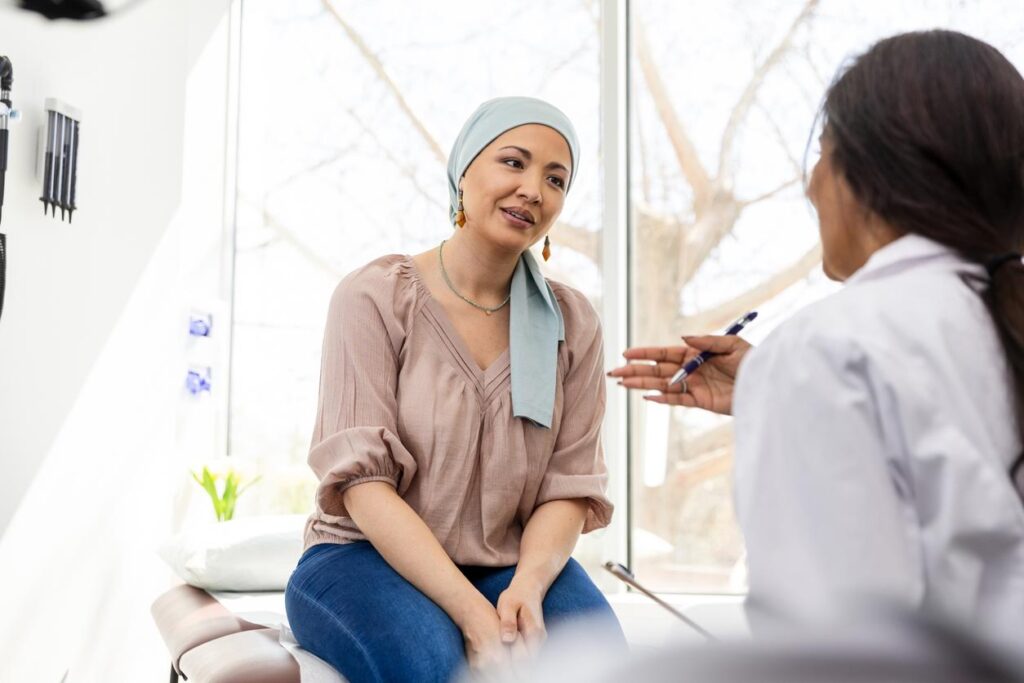The 30-Second Patient Message course will increase the knowledge and confidence of patient care teams to address sexual health with patients in a clinical setting. In this course, we will review common side effects that impact sexual function and sexual response cycle, and learners will develop their own 30-Second patient message that all patients should hear about cancer and sexual health. The 30-Second Patient Message normalizes the conversation and enables care teams to set patient expectations without disrupting the flow of the clinic. Additionally, the course will highlight Provider communication aids and patient educational materials to assist in navigating challenges with intimacy during and after cancer treatment.

The 30-Second Message – What Patients Need To Know
Published on: 01/2/25
Accreditation Information
Des Moines University Medicine and Health Sciences is the accredited provider and has approved this activity for AMA PRA Category 1 Credit™, American Osteopathic Association credit, and continuing education contact hours. The speaker(s) will disclose if any pharmaceuticals, medical procedures, or devices discussed are investigational or unapproved for use by the U.S. Food and Drug Administration (FDA). The activity director is responsible for determining educational content and selecting speakers. No ineligible company provided financial support for this continuing education activity. If you have questions regarding continuing education credit, please email cme@dmu.edu.
Upon completion of this activity, participants will be able to:
- 1. Describe the most common cancer-related side effects that impact sexual function and the sexual response cycle.
- 2. Construct and deliver a concise, inclusive 30-Second Patient Message to initiate conversations about sexual health in a clinical setting.
- 3. Apply communication aids and patient education materials to facilitate discussions around intimacy during and after cancer treatment.
Identify specialty areas to refer patients for advanced treatment of sexual health concerns and outline key steps for establishing a referral roadmap/pathway.
Sexual health concerns are common among individuals undergoing and recovering from cancer treatment. However, these issues are often overlooked or avoided in clinical conversations due to lack of training, time constraints, and discomfort on the part of providers. Many members of the oncology care team report limited confidence and insufficient tools to address these concerns effectively. This educational activity is designed to bridge that gap by offering a structured, time-efficient approach to normalizing conversations about sexual health in oncology care, using a 30-second messaging strategy grounded in evidence and patient-centered communication.
This activity is designed to address the following core competencies:
- • Interpersonal and Communication Skills: Improve ability to initiate and guide conversations around sensitive topics in a time-limited clinical environment.
- • Patient-Centered Care: Integrate whole-person care approaches by addressing intimacy and sexual health as part of survivorship and treatment planning.
- • Systems-Based Practice: Recognize appropriate referral pathways and collaborate with specialists to support patient needs.
Professionalism: Demonstrate sensitivity and inclusiveness in addressing sexual health concerns with patients of diverse backgrounds and experiences.
For any comments or questions, please reach out to Erin Sullivan-Wagner
Erin@www.aftercancer.co
THE 30-SECOND MESSAGE: WHAT PATIENTS NEED TO KNOW
CONTINUING EDUCATION INFORMATION

Des Moines University Medicine and Health Sciences is the accredited provider.
If you have questions regarding continuing education credit, please email cme@dmu.edu.
ACCREDITATION STATEMENTS:
- DO: Des Moines University Medicine and Health Sciences (DMU) is accredited by the American Osteopathic Association (AOA) to provide osteopathic continuing medical education for physicians. DMU designates this activity for a maximum of 3.75 AOA Category 2-B credits and will report CME and specialty credits commensurate with the extent of the physician’s participation in this activity.
- MD: This activity has been planned and implemented in accordance with the accreditation requirements and policies of the Iowa Medical Society (IMS) through the joint providership of Des Moines University Medicine and Health Sciences (DMU) and After Cancer, Inc. DMU is accredited by IMS to provide continuing medical education for physicians. DMU designates this enduring materials activity for a maximum of 3.75 AMA PRA Category 1 Credit(s)TM. Physicians should claim only the credit commensurate with the extent of their participation in the activity.
- Other healthcare professionals: This activity is designated for 3.75 AMA PRA Category 1 Credit(s)TM.


EDUCATIONAL GRANTS: No ineligible company provided financial support for this continuing education activity.
DISCLOSURES: Relevant to the content of this educational activity, the following individual(s) have no conflict(s) with ineligible companies to disclose.
- Arash Asher, MD – Speaker
- Christin Collins, DO, FACOS, FACS – Speaker
- Robyn Faye, MD, FACOG, MSCP, IF, CSC – Speaker
- Casey Fazer-Posorske, PA – Speaker
- Rachael McCall, PT, DPT – Speaker
- Larry Newman, DNP, AGNPPC, PMHNP, ARNP – Speaker
- Amanda Olson, PT, DPT, PRPC – Speaker
- Erin Sullivan-Wagner – Activity Director and Planning Committee Member
DISCLAIMER: The information provided in this activity is for continuing education purposes only. It is not a substitute for a healthcare provider’s independent medical judgment regarding diagnostic and treatment options for a specific patient’s medical condition.
Begin by clicking on the first lesson below.
